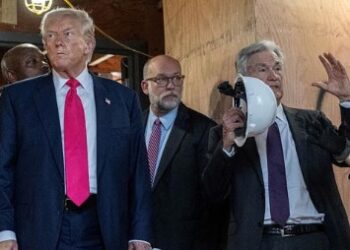In a recent conversation with Steve Bannon, Scott Bessent offered vivid analogies to illustrate the economic challenges facing the nation. Bessent, a notable figure in financial circles known for his astute analysis, compared navigating the economy to driving a Grand Prix race car, emphasizing the urgent need for a balanced approach to avoid potential breakdowns.
Bessent’s analogy offers an intriguing perspective for those seeking stability, it shows the chaotic nature of the Biden administration. Bessent contends that the administration has forced an unstable environment characterized by soaring deficits and excessive borrowing and warns that the window of opportunity for implementing a growth strategy is rapidly closing for good, suggesting that a “Trump 2.0” approach may be necessary to navigate the economic challenges ahead.
The Friday WarRoom discussion quickly moved into the complexities of international relations, particularly concerning Russia, China, and the United States. Bessent highlighted the delicate balance between economic interests and geopolitical realities, stressing the importance of addressing the problems with being so connected to China while acknowledging the challenges posed by the current debt situation.
On the Economic Race Track, Bessent told Bannon: “We can’t do anything unless we get our own house in order. This high national debt and deficits are a national security issue.”
A central point of concern for Bessent was the unsustainable nature of the growing deficit. Bessent warned against the risks of plunging into a deep recession without a coherent plan for fiscal responsibility. He stressed the need for strategic cuts and fiscal discipline, echoing concerns about the lack of a concrete roadmap to address the mounting debt.
Driving Economics Forward, Bessent told Bannon: “As we go into this great power conflict with China, we have been made more fragile. So, we have to really start working to become more anti-fragile, more robust.”
Criticism was levied at the Biden Administration’s handling of inflation and deficit financing. Bessent criticized the administration’s reliance on short-term borrowing, likening it to a credit card approach that only exacerbates the problem. This short-term focus, he argued, fails to address the underlying structural issues driving economic instability.
Looking ahead to the upcoming election, Bessent discussed the potential implications for economic policy. He suggested that strong stock market rallies reflect optimism about policy continuity under a second Trump administration. However, he underscored the gravity of the debt issue, framing it as a national security concern that requires decisive action.
Amidst discussions of potential cabinet picks and the need for a coherent economic strategy, Bessent emphasized the importance of addressing internal economic challenges before engaging in broader geopolitical maneuvers. His insights shed light on the interconnectedness of economic and geopolitical dynamics, offering valuable guidance for navigating the complexities of the current economic landscape.
Bessent’s expertise shines throughout the exchange, offering nuanced perspectives on complex economic and geopolitical issues. His recommendations for further reading, including an article by Dan Kantz, which shows his commitment to educating and informing audiences, like the Warroom, about critical economic issues.
Navigating Economic Curves, Bessent added: “This is landing a plane on an aircraft carrier and a cat.2-3 hurricane. It’s not going to be easy, but it can be done.”
The conversation between Bessent and Bannon serves as a sobering reminder of the urgent need for proactive and responsible economic policymaking. As Wall Street seeks stability amidst mounting debt and geopolitical uncertainties, Bessent’s insights provide valuable guidance for navigating the challenges ahead.
Additionally, Bloomberg News reported on Scott Bessent’s involvement in economic discussions and his contributions to the WarRoom. The report highlighted Bessent’s understanding of populist economics and his ability to convey complex concepts in engaging ways, such as using racing analogies to illustrate economic principles.
Speeding Toward Economic Solutions, Bessent said on Friday: “If there is a plan for debt reduction, then the interest rate market will respond well to that and you can start getting rate cuts.”
Furthermore, Bessent’s close attention to indicators suggesting a potential Trump victory in the upcoming election underscores the importance of political developments in shaping economic policy. He and other investors are closely monitoring polling data and stock market trends, anticipating potential shifts in policy direction under a second Trump administration.
Bessent’s seriousness about the nation’s economic challenges is evident in his remarks, particularly regarding the debt as a national security issue. He emphasizes the need for decisive action and a clear plan to address the country’s fiscal woes, highlighting the risks of inaction in the face of mounting debt and inflation.
On Biden’s Economic Approach, he said: “Everything with the Biden Administration has been a decision and a choice… Debt profile to the short end is a choice.”
Overall, Bessent’s contributions to economic discourse, both in his conversations with Bannon and in his broader engagement with financial markets, demonstrate a commitment to addressing pressing economic issues and advocating for responsible policymaking.
For more context watch Bessent and Bannon from Friday’s WarRoom:




